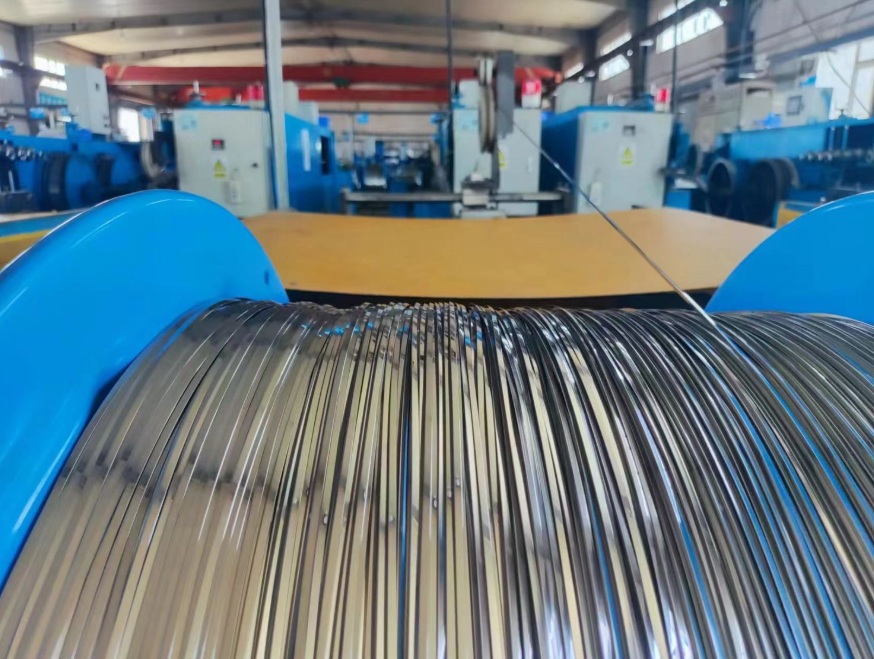
Choosing the Right Wire for Your Project
The Importance of Material Selection in Engineering and Manufacturing
Material selection is the backbone of any engineering or manufacturing project. Good wire material, besides adding mechanical performance, dictates endurance, weather resistance, and cost-effectiveness in general. In the case of an application involving extreme temperatures, chemicals, or mechanical stress, choosing between stainless steel wire and titanium wire can make a huge impact in the outcome of your project.
Evaluating the Options: Stainless Steel Wire vs. Titanium Wire
When looking at titanium wire and stainless steel wire side by side, builders need to think about physical power, surrounding settings, mass limits, and funds. Each wire brings distinct benefits that make it suitable for various industry uses.
Stainless Steel Wire: Features and Common Uses
Essential Features of Stainless Steel Wire
Stainless steel wedge wire, or profile wire and V-wire, creates a form of wire that is shaped like a V or three-cut. It is commonly used for sortation and sieving tasks in various industries because of its strong physical force, rust-resistance, and tight space control. Moreover, stainless steel wires are marked by their tough characteristics, resistance to dulling, and skin compatibility.
Typical Applications Across Industries
- Jewelry making
- Industrial filtration
- Medical equipment

Titanium Wire: Features and Common Uses
Key Properties of Titanium Wire
Titanium wire delivers a high strength-to-weight ratio, superior corrosion resistance (including seawater and many chemicals), excellent fatigue and high-temperature performance, and biocompatibility. It also offers good formability and weldability, non-magnetic stability, and precise dimensional control—available in customized diameters, tolerances and surface finishes
Common Use Cases in Advanced Fields
Titanium wires are applied widely in:
- Aerospace: manufacturing of aircraft, rockets, satellites, and other aircraft.
- Medical equipment: dentistry, orthopedics, and various medical implants
- Chemical and marine engineering: heat exchangers, reactors, pipelines
- Electronics: smartphones and laptops

Key Comparison: Stainless Steel Wire vs. Titanium Wire
1. Mechanical Strength and Weight Considerations
Both give fine physical power. Yet titanium shines with its advantages of low density and light weight. This suits it well for aerospace or car parts, where cutting mass without losing power matters a lot.
2. Corrosion Resistance Across Various Environments
Both supplies decent rust guard. Still: Stainless steel does fine in many industry settings. Titanium performs better in very harsh spots like salty water or sour chemical contact.
3. Thermal Performance at Elevated Temperatures
Titanium keeps its build solid at greater warmth levels than stainless steel. For tasks with heat exchangers or motors running at high temperatures, titanium often gets picked.
4. Cost Implications for Different Budgets
Stainless steel wire stays cheaper than titanium wire. Tasks with limited funds usually go for stainless steel, unless a certain function needs support, the greater price of titanium.
5. Trade-Offs Based on Project Requirements
Picking between these two things means weighing price against function demands. If your task calls for a high performance or extreme warmth handling, titanium could prove necessary. For basic tough nature at a smaller cost, stainless steel fits well.
How to Select the Best Wire for Your Application
1. Matching Material Properties to Environmental Conditions
For sea or chemical spots needing better rust guard, titanium might count as key. In milder settings, stainless steel gives enough shield at a smaller price.
2. Assessing Mechanical Demands and Structural Requirements
For operations with significant weight or motion, choosing the right material is crucial. While titanium provides lightweight strength, stainless steel typically offers better resistance to surface wear, ensuring durability under continuous use. In fixed installations, stainless steel remains a dependable option.
3. Budget Constraints and Long-Term Cost Efficiency
Look at not only starting prices but also upkeep costs over periods. While titanium carries a bigger first tag, it could cut swap times in rough spots.
4. Compliance with Industry Regulations
Make sure your picked stuff follows related rules—key in aerospace or health areas where papers are mandatory.

Jingzhou’s Customized Wire Solutions
Overview of Product Offerings in Stainless Steel and Titanium Wires
Jingzhou Metal has focused on making and selling stainless steel wire since 2009. Our chief items cover special-shaped wires of varied materials (stainless steel, copper, titanium), welding wires, ultra-fine wires, and wedge wire filter screens. We supply top-grade titanium wires fit for medical implants or aerospace components, along with our leading stainless steel profile wires.
Customization Capabilities to Meet Diverse Needs
Yes, at Jingzhou Metal, we give tailoring services. We can plan and build stainless steel profile wires to match certain task demands. This covers varied wire thicknesses, opening measures, and full sizes. Our group backs tailored options shaped to your exact details—whether you want complex cut shapes like T-shaped or Y-shaped profiles, or very thin thicknesses for fragile setups.
Quality Assurance and Manufacturing Capacity
We sit in Saida Industrial Park, Tianjin, with three modern manufacturing sites spanning about 18,000 square meters. Our output skill meets the exact demands of diverse tasks. We ensure a steady standard through strict checking methods.
FAQ
Q: What are the main differences between titanium wire and stainless steel wire?
A: Titanium wire offers a better strength-to-weight ratio and higher temperature tolerance, while stainless steel is more cost-effective with good general-purpose performance.
Q: Can I get customized shapes like Y-shaped or wedge-shaped wires?
A: Yes. We can design and manufacture stainless steel profile wires to meet specific application requirements, including various customized cross-sectional shapes like V-wire or Y-wire.
Q: Which material should I choose for marine environments?
A: Titanium wire provides superior corrosion resistance against saltwater exposure compared to stainless steel, making it ideal for marine applications.
Q: Does Jingzhou supply both small-batch samples and bulk orders?
A: Yes—we support both sample customization requests as well as large-scale production runs based on client needs across multiple industries.


